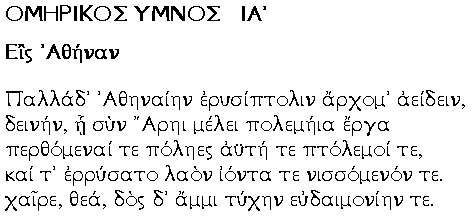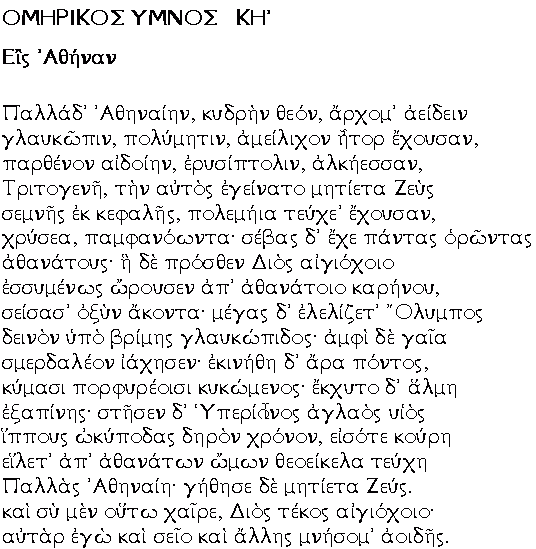

Copyright (c) 2000 Kynegeiros Euphorionos. All Rights Reserved.
kynegeiros@hotmail.com


Copyright (c) 2000 Kynegeiros Euphorionos. All Rights Reserved.
kynegeiros@hotmail.com
Many poets have composed religious hymns to Athena. These hymns were not mere poems, they were intended to be sung at religious gatherings by the Hellenes, usually with the accompaniment of the lyre or some other musical instrument. The Homeric hymns are one of the oldest collections of such hymns available to us. The poet of the Homeric hymns (modern science maintains that the hymns must not be necessarily attributed to Homer himself) dedicated two such hymns to Athena (No.11 and No.28), which we present here, both in the original Hellenic and in translations.
In addition to these there was a hymn to Athena by the Orphics which were a fringe religious group of Hellas. That hymn was also part of a collection of hymns which were attributed to Orpheus, a hero from Thrace who took part in the campaign of the Argonauts (ArgonautikÍ Ekstrateia). However it is more likely that this hymn was written during the Hellenistic age for the purposes of the Orphic cult.
Kallimakhos of Alexandria, a famed scholar of the hellenistic age also wrote a hymn to Athena which has survived to our day. It was entitled Eis ta pluntÍria tÍs AthÍnas. I will seek the Orphic hymn and the hymn by Kallimakhos in the original greek and present it with translations in this page. I will also put an anouncement on the main page of this site, so that you know of it.
Hymn No.11 is a short one, emphasizing the role of Athena as Polias or Polioukhos , i.e. as the protector of the city and the leader of the army going into battle. The Athenians prayed to the goddess for victory but so did the Spartans and all Hellenes. Xenophon, in his Lakedaimonion Politeia says that the Spartans sacrificed to Zeus and Athena at the borders of Lakonia when setting out for a military campaign. Alexandros the Great is said to have sacrificed to Athena on several occasions, the most important being before the battle at Gaugamela which sealed his victory over the Persian King.
Hymn No.28 tells the story of Athena's birth in vivid detail. It is most theatrical in its approach towards the subject. Many epithets of Athena are presented, including the most famous, Pallas, which some say is from pallein (to shake) as she shakes her spear. In this hymn instead of pallein we have the verb seiein, which I have translated as "to brandish". Another epithet is glaukŰpis, meaning with gray or owl-like eyes. This is also found in the Iliad and the Odyssey as well as in the works of Hesiod; it is a favorite attribute of the goddess. Also she is called Tritogeneia which is the most mysterious of all with many different meanings attached to it. Some highlights of the hymn are, the emergence of Athena full-formed and armed before the gods who are stuned by her beauty and the reaction of nature to her emergence. The sun Helios, the sea Pontos and the land Gaia all announce the new arrival of the fair maiden. Finally Zeus laughs gently, appreciating his beautiful daughter; the special place she has in his heart will never be questioned by any other goddess.



Download a printable PostScript file of this hymn.


Download a printable PostScript file of this hymn.


You may use the materials contained within this site provided that you:
- Respect the copyright of Kynegeiros Euphorionos and
individual authors
- Add a link to this site:
http://geocities.datacellar.net/Athens/Ithaca/1736/
This page hosted by ![]() Get your own Free Home Page
Get your own Free Home Page